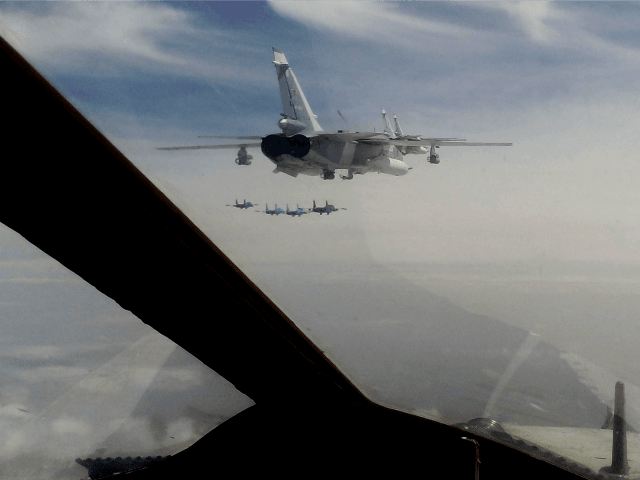MOSCOW (AP) — A Russian reconnaissance aircraft was shot down by a Syrian missile over the Mediterranean Sea, killing all 15 people on board, the Russian Defense Ministry said Tuesday. It blamed Israel for the crash, saying the plane was caught in the crossfire as four Israeli fighters attacked targets in northwestern Syria.
The Russian military said the Il-20 reconnaissance aircraft was hit 35 kilometers (22 miles) offshore late Monday as it was returning to its home base nearby.
“The Israeli pilots were using the Russian aircraft as a shield and pushed it into the line of fire of the Syrian defense,” Defense Ministry spokesman Maj. Gen. Igor Konashenkov said.
Defense Minister Sergei Shoigu called his Israeli counterpart, Avigdor Lieberman, later Tuesday to say that Israel is “fully to blame” for the deaths, the ministry said.
The military said Israel did not warn it of its operation over Latakia province until one minute before the strike, which did not give the Russian plane enough time to escape.
The Israeli military said in a statement Tuesday that its jets were already within Israeli airspace when the incident occurred. Israel offered condolences over the death of the Russian troops but said it holds the Syrian government “fully responsible.” It also blamed Iran and Hezbollah for what it described as an “unfortunate incident.”
The Russian Defense Ministry said a recovery operation has already located the plane’s wreckage at sea and has retrieved some bodies and some fragments of the plane.
For several years, Israel and Russia have maintained a special hotline to prevent their air forces from clashing in the skies over Syria. Israeli military officials have previously praised its effectiveness.
Russia has been a key backer of Syrian President Bashar Assad and it has two military bases in the country, including one close to the Mediterranean coast.
Russia’s dramatic entry into the Syrian civil war in 2015 in support of the Syrian government, after a year of airstrikes by the U.S. and its coalition partners against the Islamic State group, increased the specter of dangerous confrontations in the skies over Syria.
Turkey’s troops are also on the ground in northern Syria and are patrolling the skies over the region as Ankara seeks to ramp up its influence there and curb the expansion of Syrian Kurdish-controlled territory.
Israel has refrained from taking sides in the Syrian civil war. But it has acknowledged carrying out scores of airstrikes against archenemy Iran and its Shiite proxy Hezbollah.
Israel has also acknowledged attacking Iranian targets some 200 times. Israel has warned that it will not allow Iran to establish a permanent military presence in postwar Syria.
Throughout the fighting, Israeli Prime Minister Benjamin Netanyahu has maintained continuous contact with Russia. Netanyahu frequently travels to Russia for talks with President Vladimir Putin to discuss the Syria issue.
The Israeli military said the Russian plane fell victim to the “extensive and inaccurate” firing of Syrian surface-to-air missile systems and that the Israeli jets — which were carrying out a raid against a Syrian government facility in another place — had already left Syrian airspace by that point.
The Israeli military said that hotline with Russia was in operation and that it would share with Russia all the data at its disposal.
Sima Shine, a former senior Mossad official and ex-deputy director-general at Israel’s Strategic Affairs Ministry, told Israel’s Army Radio station that the shooting down of the plane is problematic for many reasons.
“I think it will impose very serious restriction on Israel’s freedom of activity,” she said.
The plane crashed only hours after the leaders of Russia and Turkey reached an agreement to avert an all-out offensive by Syrian government forces to retake Syria’s last remaining rebel stronghold in Idlib.
Putin’s spokesman, Dmitry Peskov, on Tuesday called the deal “a landmark and crucial agreement for Syria’s future” and said the shooting down of the plane will have no impact on it.
In Damascus, Syria’s foreign ministry welcomed the agreement, while vowing that it will continue the fight against “terrorism until liberating the last inch of the Syrian territory, whether through military operations or through local reconciliations.”
Iran also welcomed the agreement, with Foreign Minister Mohammad Javad Zarif tweeting: “Diplomacy works.”
___
Josef Federman and Ian Deitch in Jerusalem and Bassem Mroue in Beirut contributed to this report.

COMMENTS
Please let us know if you're having issues with commenting.